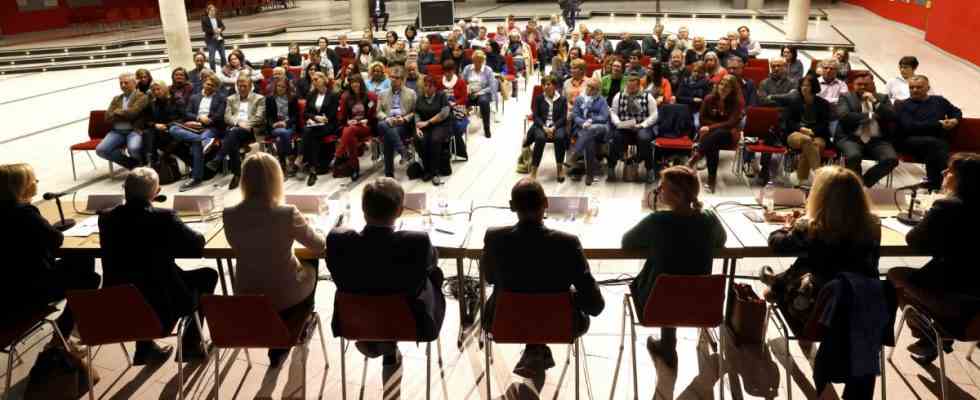In the panel discussion on Thursday in Neufahrn on the subject of all-day care, one sometimes had the impression of being at a table tennis game. On the one hand there is the Bavarian government in the person of Ulrike Scharf (CSU), Minister of State for Family, Labor and Social Affairs, who sees responsibility in the local authorities. On the other hand, there are the representatives of the opposition parties and, above all, the municipalities themselves, who are sending the ball back to the government and have already started a call for help – because ultimately they are the ones who have to make the all-day care places available. And they say, to put it simply: we won’t be able to do that under the current framework conditions.
In 2026, the legal entitlement to all-day care for primary school children will come into force throughout Germany. It comprises 40 hours per week including lessons and is closed for a maximum of four weeks per year. It is still unclear what percentage of the children will actually take up a place: the Bavarian Ministry for Family Affairs assumes around 80 percent, although the figure is likely to be higher in Munich and lower in the countryside. But if you look at the situation, especially with a view to the shortage of skilled workers, you ask yourself how this can be managed at all.
“We don’t know how we can implement this adequately,” says the second mayor of Augsburg, Martina Wild (Greens), who chairs the education committee in the Bavarian City Council and was the voice of the municipalities in the panel discussion. She refers to the “massive shortage of skilled workers, which will increase” and expressly wants more support from the state and federal government, “both in the investment area and in operation”.
Bavaria is at the bottom when it comes to all-day care and has been for years. According to a study by the Bertelsmann Foundation 36 percent of children of primary school age use an all-day offer, another 22 percent use an afternoon offer that is available until around 2:30 p.m. – that makes a total of 58 percent, less than in any other federal state. But even if family minister Ulrike Scharf (CSU) wants to sell it as “good news” that “lunchtime care also satisfies legal claims” as long as it covers eight hours a day, the situation does not appear to be any less serious. According to the Bertelsmann Foundation, around 21,000 specialists are missing for all-day funding.
Minister of State Ulrike Scharf (CSU) says the government has “made teacher training more attractive”.
(Photo: Marco Einfeldt)
For the Greens state politician Katharina Schulze, the Söder government has simply done “too little” in recent years. And she’s still doing very little: “Bayern has only withdrawn 19 percent of the funds” to which it is entitled, she says. We are talking about the federal investment program for the accelerated expansion of infrastructure for all-day care. While some states have already drawn down all of their funds, Bavaria is “at the bottom”, as Minister Scharf herself admits. Scharf is “not satisfied” with this, but she emphasizes that responsibility lies in the hands of the municipalities. Because this federal aid runs through the federal state, but must be accessed by the municipalities themselves. The question now is: Why do the Bavarian communities, unlike the rest of the Federal Republic, call for so little money? For Schulze there is still “too much uncertainty”, for state politician Julika Sandt (FDP) the “eligibility criteria in Bavaria are too complex and not practical”.
The opposition also complains that the government has done too little in the area of the shortage of skilled workers. Among other things, the Greens are calling for faster recognition of foreign qualifications. Minister for Family Affairs Scharf says the government has “modernized” early childhood education and made it “more attractive” financially. Remuneration for the training from the first year, as many are demanding, is simply not planned. But if that were the case, it would only improve the overall situation minimally: Very few educators are satisfied with their working conditions, and many leave the industry after a few years.
Harald Renz suggests involving music schools, sports clubs or theater groups
The panel discussion also dealt with the question of what good all-day care could look like. SPD state politician Doris Rauscher, herself a trained educator, emphasizes that children are not “kept and kept” in all-day care, but should have a “great time”. Harald Renz, chairman of the regional association of day-care and school development associations, suggested integrating music schools, sports clubs or theater groups more into all-day care. Not only in order to offer the children various opportunities and inputs, but also in order not to burden the teachers and the pedagogical specialists in general, who are a rare commodity anyway. “Models that rely on teachers are hopeless in the next few years,” said Renz. The only problem is: Appropriate space should also be made available for music or sports activities, which not all schools have. In principle, according to Family Minister Scharf, it is important to “use the existing infrastructure”.
The panel discussion lasted a total of two hours, and many questions from the audience could not be answered due to time constraints. Some mayors and some parents left the hall not in the best of moods as far as the children were concerned – as expected, they were not present at an evening event. And in general, they are rarely questioned, although it is mainly about them.

